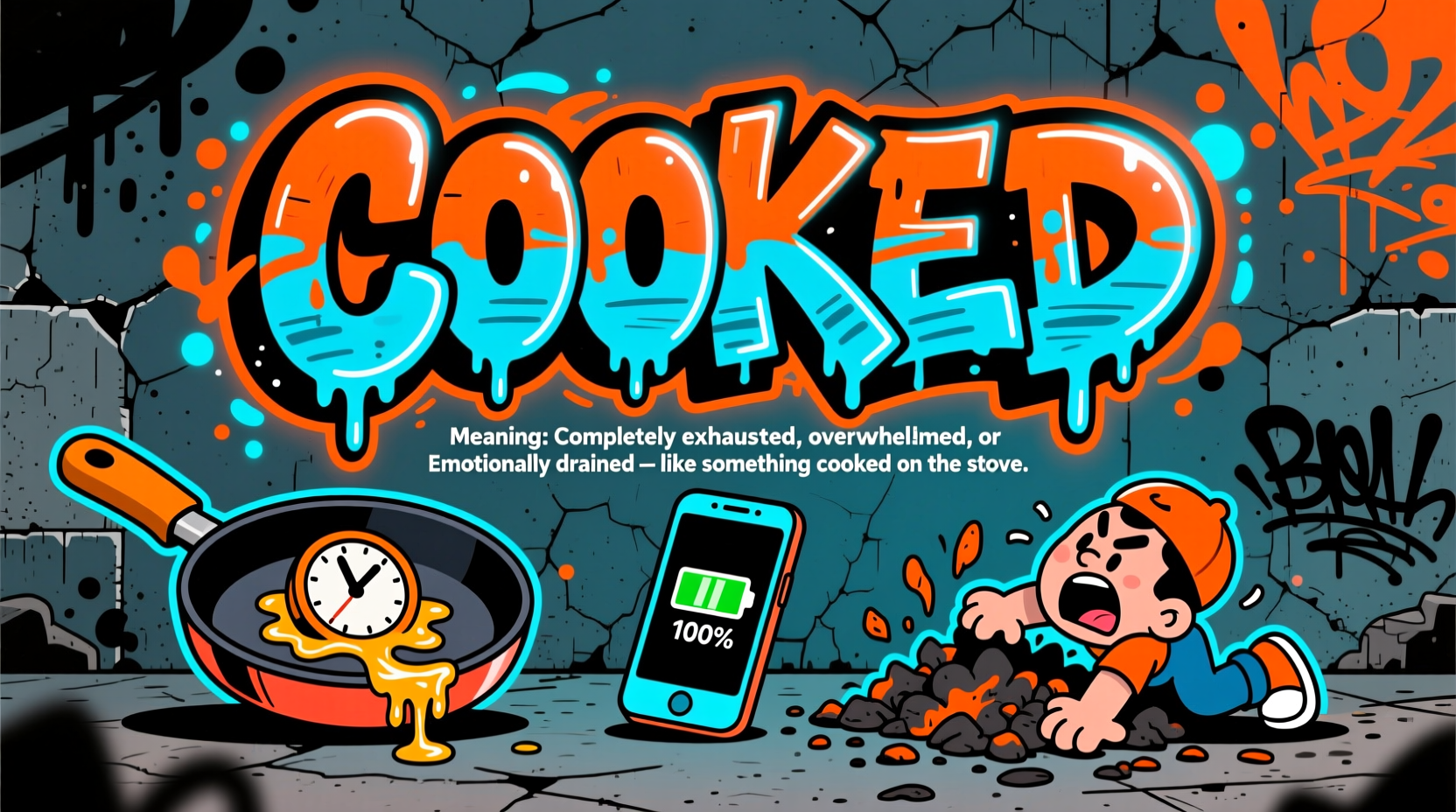Understanding the Slang Meaning of 'Cooked'
When you hear someone say they're "cooked," they're almost certainly not talking about being prepared in an oven. This versatile slang term has entered mainstream vernacular with several distinct meanings that depend entirely on context. Unlike its culinary counterpart, slang 'cooked' describes states of being rather than food preparation.
Primary Meanings in Modern Usage
The slang term 'cooked' carries three dominant meanings in contemporary informal speech:
- Under the influence - Most commonly refers to being high on marijuana or other substances
- Extremely tired - Describes physical or mental exhaustion beyond normal fatigue
- In serious trouble - Indicates being caught in a difficult situation with limited options
These meanings often overlap depending on context. For example, someone might say "I'm so cooked after that exam" meaning both exhausted and potentially in academic trouble.

Context Determines Meaning
Unlike dictionary definitions with fixed meanings, 'cooked' requires careful attention to surrounding context. Consider these usage scenarios:
| Context | Most Likely Meaning | Example Sentence |
|---|---|---|
| After smoking marijuana | Under the influence | "Dude, I'm totally cooked after that joint." |
| Following intense physical activity | Extremely tired | "After running that marathon, I'm completely cooked." |
| When caught doing something wrong | In serious trouble | "If my boss finds out I broke the printer, I'm cooked." |
Evolution Timeline of 'Cooked' Slang
The journey from kitchen to street slang reveals fascinating linguistic adaptation:
- 1930s-1950s: Early jazz musicians used "cooked" to describe being under the influence of drugs, particularly marijuana
- 1970s-1980s: Term gained wider usage in counterculture movements and appeared in music lyrics
- 1990s-2000s: Expanded meaning to include exhaustion, appearing in movies and television shows
- 2010s-Present: Digital communication accelerated the term's spread across social media platforms
Linguists at the Oxford English Dictionary have documented this semantic shift, noting how cooking terminology frequently evolves into slang describing altered states. The connection likely stems from the transformation that occurs during cooking - just as raw ingredients change when cooked, a person's state changes when under the influence or exhausted.
Regional and Demographic Variations
While 'cooked' appears globally, usage patterns differ significantly:
- North America: Primarily means under the influence of marijuana, especially on the West Coast
- United Kingdom: More commonly refers to being in trouble or exhausted
- Australia: Often used to describe extreme heat exposure ("I'm cooked from that sun")
According to Lehigh University's linguistic research, the term appears most frequently among 18-35 year olds, with usage increasing dramatically in social media posts since 2015. However, older generations may interpret it differently or not recognize the slang meaning at all.
Related Slang Expressions
'Cooked' rarely appears in isolation. It often connects with other contemporary slang:
- Cooked and battered - Extremely high or exhausted
- Cooked to perfection - Ironic usage indicating extreme state
- Getting cooked - Being dominated in competition or argument
- Not even cooked - Not high enough or not sufficiently prepared
Understanding these combinations helps decipher the nuanced meaning in casual conversation. For instance, "I got cooked in that debate" means being thoroughly defeated, while "I'm cooked off that edible" specifies marijuana consumption.
When to Avoid Using 'Cooked' Slang
Despite its popularity, this term has clear boundaries for appropriate usage:
- Professional settings: Never use in workplace communications or formal presentations
- With unfamiliar audiences: Older generations may interpret literally
- Cross-cultural communication: Non-native English speakers likely won't understand the slang meaning
- Written documentation: Avoid in any official or legal contexts
Linguistic experts at Linguistic Society of America recommend reserving 'cooked' for casual settings with peers who share your linguistic community. Misusing slang in inappropriate contexts can damage credibility or create misunderstandings.
Practical Application Guide
To use 'cooked' correctly in everyday conversation:
- Assess your audience's likely understanding of contemporary slang
- Consider whether the context clearly indicates non-literal meaning
- Pair with additional context clues ("I'm so cooked from that workout")
- When uncertain, opt for more precise language ("I'm extremely tired")
- Listen for how others use the term before adopting it yourself
Remember that slang evolves rapidly. What's current today might sound dated in a few years, so stay attuned to how language shifts in your social circles. The most effective communicators understand both when to use slang and when clearer language serves better.











 浙公网安备
33010002000092号
浙公网安备
33010002000092号 浙B2-20120091-4
浙B2-20120091-4